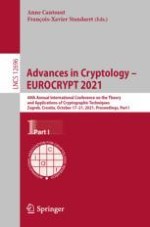2021 | OriginalPaper | Chapter
Efficient Bootstrapping for Approximate Homomorphic Encryption with Non-sparse Keys
Authors : Jean-Philippe Bossuat, Christian Mouchet, Juan Troncoso-Pastoriza, Jean-Pierre Hubaux
Published in: Advances in Cryptology – EUROCRYPT 2021
Publisher: Springer International Publishing
Activate our intelligent search to find suitable subject content or patents.
Select sections of text to find matching patents with Artificial Intelligence. powered by
Select sections of text to find additional relevant content using AI-assisted search. powered by
